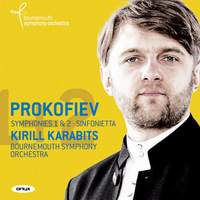Interview,
Prokofiev from Kirill Karabits
 Ukrainian conductor Kirill Karabits, since 2009 conductor of the Bournemouth Symphony Orchestra, is midway through recording the complete symphonies of Sergei Prokofiev. He's already wowed the critics with the fairytale sounds of No. 7 and the classical refinement of No. 1, and now turns his attention to the wartime No. 5 - which he also recently conducted at the BBC Proms - alongside No. 4, a re-working of previously-composed themes for a ballet.
Ukrainian conductor Kirill Karabits, since 2009 conductor of the Bournemouth Symphony Orchestra, is midway through recording the complete symphonies of Sergei Prokofiev. He's already wowed the critics with the fairytale sounds of No. 7 and the classical refinement of No. 1, and now turns his attention to the wartime No. 5 - which he also recently conducted at the BBC Proms - alongside No. 4, a re-working of previously-composed themes for a ballet.
Prokofiev's symphonies, like so many Soviet compositions, often seem complex in terms of how they reflect the artist's relationship with politics; while this is perhaps most obviously the case with Shostakovich, Prokofiev too was not above the political machinations of his time.
I asked Kirill about this aspect of Prokofiev's writing, and how much importance it's right to attach to the political side of things when approaching musical works.
Some commentators have compared the reception of Prokofiev’s wartime Fifth symphony with that of Shostakovich’s Eighth, written around the same time – speculating that the former’s largely optimistic work pleased the authorities and conformed better to the spirit of Socialist Realism than the latter. Do you think this is true – and could it even be that, in writing a triumphant work in anticipation of the Soviet Union’s defeat of the Third Reich, Prokofiev was deliberately giving the political establishment what it wanted?
I personally can’t find or feel any political messages hidden in the music of the Fifth symphony. I believe that Prokofiev’s optimism in the music comes from and is addressed to the listeners in the first place, rather than political leaders. For me the comparison between Shostakovich and Prokofiev is only useful when we analyse their different approaches to the reality rather the similarities. Shostakovich is a realist, he describes exactly what he sees and feels in his symphonies and Prokofiev is almost the opposite - he writes music that often takes us away from the reality and pushes for hope.
Obviously the influence of war on the music is nowhere near as overt as, for instance, the sinister rattlings of the first movement of Shostakovich’s wartime Leningrad Symphony. How much do you think it’s right to regard the Fifth as being “about” the war, rather than as largely absolute music?
The Fifth is not about the war (apart from maybe just one single moment - climax in the third movement), it is Prokofiev’s reaction to the war. Instead of mourning the dead, he invests in a hope that helps to overcome the tragedy and look into the future.
The Fourth Symphony is based heavily on material discarded from Prokofiev’s music for L’enfant prodigue. Do you think this “second-hand” nature is apparent in the symphony – and if so, might this be partly why its success was relatively limited?
I believe that the music material, even though it is borrowed from the ballet, is put in a totally different symphonic context which gives it a strong identity of a symphony with its sonata form structure, development, climax, rather then a ballet suite.
Why did you choose to record the earlier (1930) version of the symphony, rather than the substantially reworked 1947 version? Some people have seen the latter as being the result of Prokofiev applying the principles of Socialist Realism to his own earlier composition – so would the 1930 version therefore be perhaps the more “authentic” piece?
We have recorded both versions of the Fourth symphony. Although based on the same material, the earlier 1930 version is a much shorter and lighter work. It is obvious that in his later 1947 version Prokofiev was mainly trying to create a full scale symphony and take it even further away from the ballet rather than applying any political principles.
Some critics have singled you out for praise for drawing a “near-Russian” sound from the Bournemouth musicians. Do you think there’s still such a thing as a distinctive national orchestral sound these days, as there has been historically?
To me, the sound that a conductor creates with an orchestra should be based on what makes more sense to the music. Although the orchestral sound today is much more universal than before, a conductor should still know how to use a tradition and mental background of an orchestra to achieve a certain sound which suits better the music. In our Prokofiev recordings we tried to privilege mainly the clarity and expression.
Kirill Karabits' Prokofiev series so far...
Released last month, Karabits's recording of Symphonies Nos. 4 & 5 was described by The Daily Telegraph as 'a testament to [his] understanding of the composer.”'; also includes the symphonic poem 'Dreams'.
Available Formats: CD, MP3, FLAC, Hi-Res FLAC
Symphonies Nos. 3 & 7, including the optimistic alternative ending to No. 7 (added to deflect potential criticism from the Soviet musical establishment); a Gramophone Editor's Choice last June.
Available Formats: CD, MP3, FLAC
The first two symphonies, the rarely-heard Sinfonietta and the early symphonic poem 'Autumnal Sketch', in 'a realisation of unrivalled clarity and balance' (Gramophone).
Available Formats: CD, MP3, FLAC





